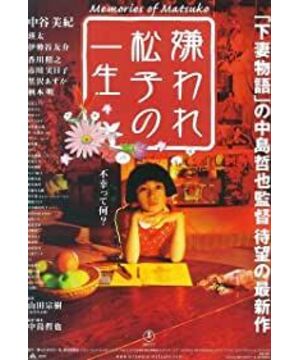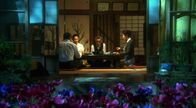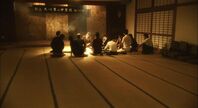It's a cliché to never give up being moved for innocence and perseverance, or to make fun of destiny's impermanence.
Most of the people who talk about Dazai’s suicide and psychopathic personality disorder are mostly non-psychological guys who pretend to be experts—how can we talk about abnormalities if we can’t give a strict academic definition of "normal"? Not being insane is just another form of insanity. You cannot use confinement to confirm your sanity.
Probably the most immediate feeling most people feel is that each of Songzi's life choices is wrong. Maslow said that people have five basic needs: survival needs, safety needs, love needs, respect needs, and self-realization needs. Songzi’s life is trapped in the “needs of love”, and survival needs can be minimized. Safety can be disregarded, respect and self-realization Songzi does not care much, everything is out of balance because of love.
Regarding the "need for love", Matsuko is not too troubled by Sony Ericsson, but is more aggrieved for not being able to give a super large amount of love. There are three sentences from Songzi throughout the whole story: 1. Why. 2. My life is over. 3. I'm sorry to be born.
Why can't my father give me some care for my sister? Why do I just want to settle the incident of students stealing money and let others suffer all kinds of grievances and finally lose my job? Why did I give so much to Yamegawa but be abused by him? Why did I lose to Okaya's mediocre and ugly wife? Songzi yelled "why" and was not looking for the reasons why things got worse, and she had no interest in improving the status quo. Her "why" means "why!"
Because she is qualified not to reflect. A guy who has enough capital can lose money without having to reflect on whether the business strategy is correct. The capital of Songzi is that she has strong anti-strike ability and self-healing function is like the legs of a gecko's tail and an octopus. Whether facing the suicide of Yamegawa or killing someone with a knife herself, in any desperate situation, she can resurrect in situ full of hope shortly after lamenting "My life is over"-although not resurrected full of blood-once. Strikes still leave scars in life.
The continuous increase in scars will also leap from accumulation to qualitative change. The last blow was when she was released from prison but was overthrown by Long Yang. She asked "why" again, and she finally started to reflect. However, this only time of introspection ruined her, because she concluded that the introspection was : My life is meaningless, I am more than unworthy of being loved, even if it is for others to love, no one cares about it. This dismissed life is really "born as a human, I'm sorry".
That's it. How sensitive people can be truly moved by such incredible persistence and perseverance? What kind of ancestral grave feng shui makes you experience such a rare fate to tease you and empathize with tears in your eyes? It is better to give this story a more fluent explanation:
if you have watched "Jigong" by Stephen Chow, you can easily think of Songzi as an unawakened Jigong. Jigong's predecessor was Jianglong Arhat. He bet with the gods on "whether the world can be saved". The gods agreed that the world had fallen into sin and was hopeless, but Jianglong had to save the three most hopeless medicines by his own power. The guy: the ninth beggar, the ninth pheasant, the ninth wicked; for this reason, the dragon can sacrifice the qualifications of the gods, can bear any prejudice and misunderstanding, and can even destroy his golden body, even if the disaster is over, he must prove the world to the gods. Saveable.
Jigong and Prometheus are a bit like. Pine nuts can also be a god who insists on trying to prove that "the world can be saved". She came to the world with full of love, but accidentally forgot that the topic she wanted to prove was What? So I want to give love to whoever I meet by instinct, but unfortunately everyone is narrow and fragile, and no one can withstand such a strong and pure love. The world without love is hell. Although Matsuko has forgotten the topic she wants to prove, this broken journey of life has indisputably proved to her that "the world is not saved." Matsuko did not give up the hope of love when she died. She retrieved the business card of her cellmate Aoi Mizusawa who wanted to hire her as a stylist. She said "I still have use", but the gods who opposed her opinions were tired of her. After failing again and again, they were not ready to give her another chance. They instructed the child to swing her to death and use a cruel and ridiculous method of death to finally emphasize that "the world is incorrigible". What if Long Yang said that pine nuts were his god? Jesus is still nailed on the cross! The gods are nothing more than being wounded and broken into pieces by the ugly world, and then piled up by them, pinched together, and molded into statues for them to visit.
What makes us lament and lament is definitely not the fate of pine nuts as a person, but more than just being born.
Otherwise, no one can explain why Songzi can only spend so miserably a life of dislike.
View more about Kiraware Matsuko no isshô reviews











